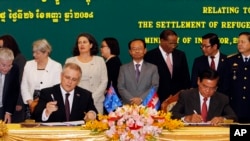Cambodia said it is reviewing the case of the first refugee at the Nauru detention center to volunteer for a controversial Australian resettlement plan.
Interior Ministry spokesman Khieu Sopheak Thursday told the VOA Khmer service the first refugee to agree to resettle in Cambodia is an ethnic Rohingya who had fled Myanmar hoping to resettle in Australia.
“A person, who phoned me, said a refugee had registered, a male, Rohingya,” he said. “We don’t know his age or appearance," Sopheak said.
Kem Sarin, the head of Cambodia’s immigration department, said officials who traveled to Nauru this week are still working on the case.
“At the moment, we have not received any documents," he said.
“What we know so far, our officials at Nauru interviewed him [Wednesday] and are preparing the documents, which will be sent later to Cambodia and we will review it,” Sarin said.
Cambodia signed an agreement with Australia last year to accept more than 1,000 refugees, who are being detained by Australia on the island nation of Nauru. The agreement included what has been described as a $30 million aid package for Cambodia.
The agreement has been strongly criticized by international and Cambodian human rights groups as a violation of U.N. refugee rights. But Sopheak said Cambodia is doing humanitarian work in accepting the refugees.
News of the first refugee to agree to the plan comes a day after the Australian immigration minister warned refugees to voluntarily accept the offer from the Cambodian government.
Peter Dutton told the refugees via a video clip that, “you will not, under any circumstances, be settling in Australia. This is not an option that the Australian government will ever present to you.”
Reports earlier this week indicated that one Iranian and three Sri Lankans have also agreed to resettle in Cambodia. However, officials in Phnom Penh Thursday denied the reports, saying only one person so far has registered for resettlement.
The Rohingya, a Muslim ethnic minority group from Myanmar’s western Rakhine state, have claimed oppression by the country’s Buddhist majority.
This report was produced in collaboration with the VOA Khmer service.




